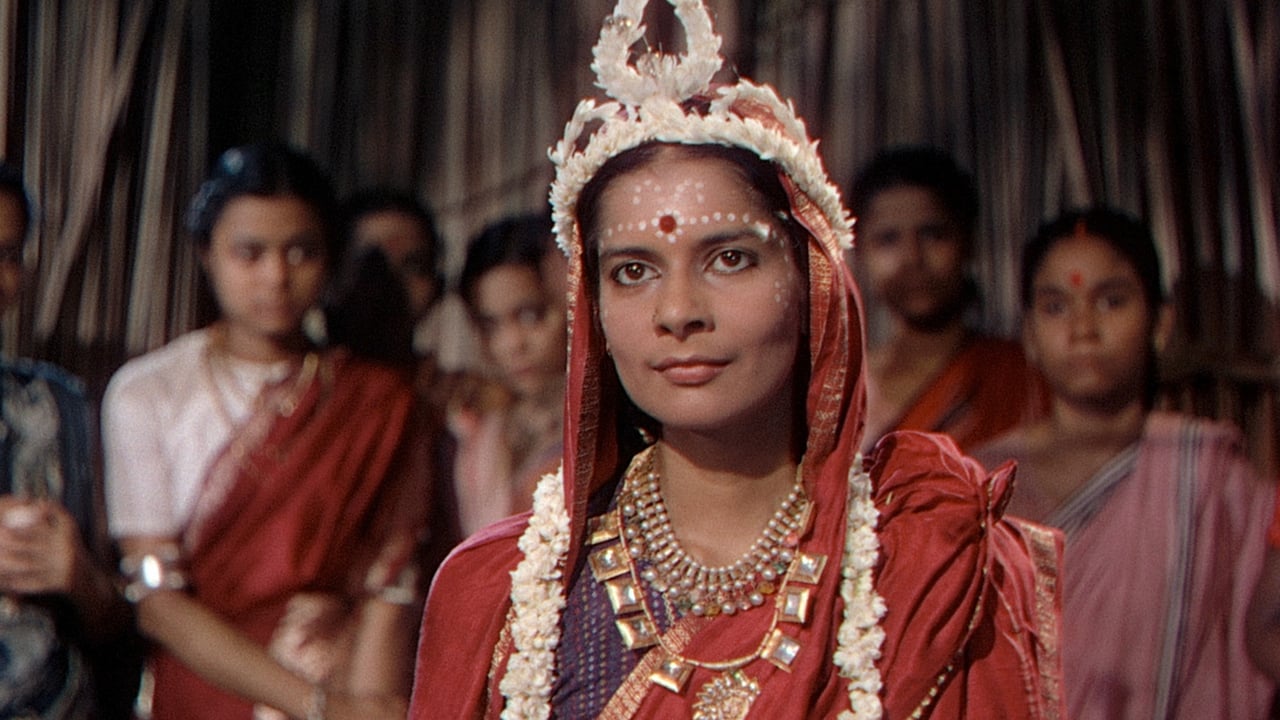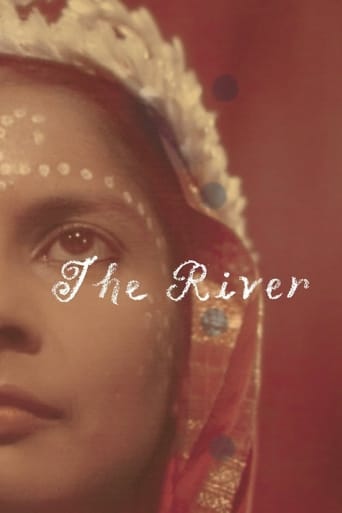

the leading man is my tpye
... View MoreSelf-important, over-dramatic, uninspired.
... View MoreThis is an astonishing documentary that will wring your heart while it bends your mind
... View MoreGreat movie. Not sure what people expected but I found it highly entertaining.
... View MoreIn Bengal, India, the teenager Harriet (Patricia Walters) is the oldest daughter of a British family composed by her father (Esmond Knight) that lost one eye in the war and is the manager of a jute factory; her mother (Nora Swinburne) that is pregnant; and her four younger sisters and one little brother. They have a quiet and comfortable life living in a big house nearby the Ganges River. Valerie (Adrienne Corri) is the teenage daughter the owner of the jute factory where Harriet's father works that spends most of her time with Harriet. Melanie is the British-Indian daughter of Harriet's neighbor Mr. John (Arthur Shields) that has just returned from an education in England. When the young American Captain John (Thomas E. Breen) that lost one of his legs in the war comes to Bengal to visit his cousin Mr. John, the three teenagers fall in love for him. "The River" is a story of first love in the exotic India and metaphorically compares the Ganges River with the flow of life with the lead character leaving her childhood and becoming an adolescent. The screenplay of this romance has many beautiful quotes, but excessive narrative from a grown-up Harriet. The cinematography is stunning, with the use of bright colors in the environment of India. Thomas E. Breen performs an outcast character that has a great complex due to the loss of one of his legs but he does not transmit this feeling to the audience. The red-haired Adrienne Corri is a very beautiful young woman that gives credibility to her sixteen year-old character. The Brazilian DVD was released by Continental Distributor. My vote is six.Title (Brazil): "O Rio Sagrado" ("The Sacred River")
... View MoreI'm at a loss, frankly, to understand why people rave about this film. I saw it this evening and was aching for it to end.The picture seems to alternate between being a Cooks Tour Indian travelogue and a tedious domestic drama in the worst of the British Raj tradition. The white people are all very serious and say things that I think are supposed to be profound but, for the most part, simply sound ludicrous. (There's actually one mother-daughter scene where daughter is told that the pain of childbirth is nothing compared to the joy of making a child for the husband you love. I expect that the "close your eyes and think of England" line ended up on the cutting room floor.) The tedious story is aggravated by some of the worst acting you're likely to have the chance to see in a single two hour sitting and an endless voice-over narration that seems to substitute for actual filmic storytelling. (Plus there are a couple of unbelievable moments -- like when the 13/14? year old English girl is apparently free to wander about the town by herself. I'm not saying she wouldn't have been safe, but I find it hard to believe she would be allowed to do that.)But rest assured that all the Indians we see are seen only through the lens of how picturesque their impoverished lives are --- especially when you're watching from the veranda of your big English house. Everyone seems to spend the day playing music or bathing in the river or preparing for a festival. How fun!!! I can only think that the supersaturated Technicolor was overwhelming to audiences in the 1950's and that people hadn't really seen anything about India before. To me today, it comes across as a garbled mess -- like a Powell/Pressburger film made on a $2.95 budget. Ugg.If you want to see some wonderful film-making about the real India of roughly the same period watch any (or all) of Satyajit Rey's amazing "Apu" trilogy (Pather Panchali, Aparajito, Apur Sansar) instead.
... View MoreIndia has, through the years, fascinated many a major film-maker, including Robert Flaherty, Fritz Lang, Louis Malle, Michael Powell, Roberto Rossellini and Jean Renoir. Renoir's film, based on a novel by English novelist Rumer Godden of BLACK NARCISSUS (1947) fame, is as gorgeously shot (in ravishing Technicolor) as can be expected from a master film-maker and the son of a famous French impressionist painter; however, the narrative itself is rather disappointingly thin to support its 99-minute running time. Having said that, the coming-of-age story of two English girls living in India and loving the same young officer wounded in WWII, is appealingly performed by Nora Swinburne, Esmond Knight, Arthur Shields and Adrienne Corri. The central character, played winningly by newcomer Patricia Walters (whose only film this turned out to be) is a stand-in for Godden herself, whose considerable writing talent was not encouraged by her stern family. The film offers Renoir another chance to show his humanist side dwelling as it does on the strange (to Western eyes) social and religious customs of the Indian people; even so, when all is said and done, there is just too much local color in the film. However, as Renoir is not only one of my favorite film directors but arguably the greatest of all French film-makers, I am confident that a second viewing of THE RIVER will elevate significantly my estimation of it, as it is probably too rich an experience to savor all at one go.Among the copious supplements on the Criterion DVD, there is a typically enthusiastic interview with Martin Scorsese (who also helped in funding the film's restoration) who waxes lyrically on the effect the film had on him as a 9 year-old film-goer; surprisingly for me, he also confesses that the appeal of Renoir's masterpiece, LA REGLE DU JEU (1939), an automatic candidate for the title of the greatest film of all time, escapes him!!
... View MoreThe quality of the image on the Criterion Collection is superb. It is the highest quality I have seen on my HDTV - you would miss a lot on a lower-resolution screen. The movie is a visual treat for its color and scenery. However, the acting is weak, pretty awful really. Captain John turned me off to such an extent that he kind of soured the movie for me. Somewhere it was mentioned that they were trying to get Marlon Brando for the part of Captain John - he would have been able to project brooding, rather than the sulking we get with Breen.There is an excessive amount of voice-overs, which I think is never a good sign - usually happens when you can't get the story to convey what is desired. But, in some ways, I think the movie might have been better for me if it had gone to the extreme and just been still images with music and voice-overs - kind of in a beautiful colored Ken Burns style. But, an exception would have to be made for one incredible dance scene. All of the scenes of local Indian culture are most interesting. I have the feeling that I would like the book better than the movie.Some of the ideas were a bit dated, like Harriet's mother telling her that women are put on earth to bear men's children.I liked the extras more than the actual movie. The introduction by Renoir was interesting, how he explained that making this movie, and being in India, changed how he viewed the world and made him more accepting. That certainly was one of the main themes of the movie. And how Renoir came to team up with McEldowney (the co-producer) was of interest. The interview with Martin Scorsese is a highlight- his enthusiasm for the movie rubbed off a bit and made me less critical. He is a captivating speaker with a tremendous knowledge of movies.Also, the BBC documentary on Rumer Godden was, for me, better than the movie. I think she was indeed a little peculiar, an adjective she applied to herself. And there were some peculiar scenes in that documentary, like when Godden was sitting on the porch and there were a bunch of Indians all lined up to her left on the grass. And she just continued sitting there and the Indians just kept looking at her. There was a similar scene with her on a busy street. And then there were all of those shots traversing Godden 360 degrees while she just stood there. And all of those close-ups of her that went on for thirty seconds or so while she just stared off in the distance. Her own personal story could make a good novel.I could not make it through the interviews with McEldowney - he bored the pants off of me.
... View More